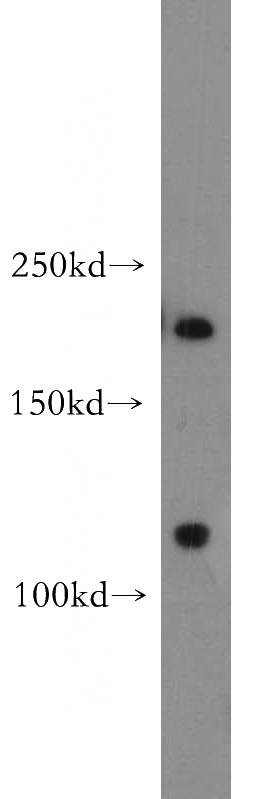-
Product Name
MTUS1 antibody
- Documents
-
Description
MTUS1 Rabbit Polyclonal antibody. Positive WB detected in human skeletal muscle tissue, mouse uterus tissue. Observed molecular weight by Western-blot: 120kd,180kd
-
Tested applications
ELISA, WB
-
Species reactivity
human, mouse, rat; other species not tested.
-
Alternative names
MTUS1 antibody; AT2 receptor binding protein antibody; MP44 antibody; GK1 antibody; DKFZp686F20243 antibody
-
Isotype
Rabbit IgG
-
Preparation
This antibody was obtained by immunization of MTUS1 recombinant protein (Accession Number: BC033842). Purification method: Antigen affinity purified.
-
Clonality
Polyclonal
-
Formulation
PBS with 0.02% sodium azide and 50% glycerol pH 7.3.
-
Storage instructions
Store at -20℃. DO NOT ALIQUOT
-
Applications
Recommended Dilution:
WB: 1:500-1:5000
-
Validations

human skeletal muscle tissue were subjected to SDS PAGE followed by western blot with Catalog No:112882(MTUS1 antibody) at dilution of 1:500
-
Background
MTUS1, also named as ATBP, ATIP, GK1, KIAA1288 and MTSG1, Belongs to the MTUS1 family. It cooperates with AGTR2 to inhibit ERK2 activation and cell proliferation. MTUS1 may be required for AGTR2 cell surface expression. Together with PTPN6, induces UBE2V2 expression upon angiotensin-II stimulation. Isoform 1 inhibits breast cancer cell proliferation, delays the progression of mitosis by prolonging metaphase and reduces tumor growth. MTUS1 up-regulation during cellular transition from proliferation to quiescence and differentiation. It is a potential tumor suppressor gene located at chromosome 8p21.3.22, near marker D8S254. According to the functional data and intracellular localization, MTUS1 also named as mitochondrial tumor suppressor gene 1 (MTSG1). One main feature common to all ATIP members is the presence of a large C-terminal coiled-coil domain that allows homo- and hetero-dimerization of these proteins. (PMID:12692079, 15123706) The antibody can recognize all the isoforms except isoform 5 (85-90kd). The antibody tested HomoDimer isoforms (110-120/180kd) in Human skeletal muscle.
Related Products / Services
Please note: All products are "FOR RESEARCH USE ONLY AND ARE NOT INTENDED FOR DIAGNOSTIC OR THERAPEUTIC USE"
